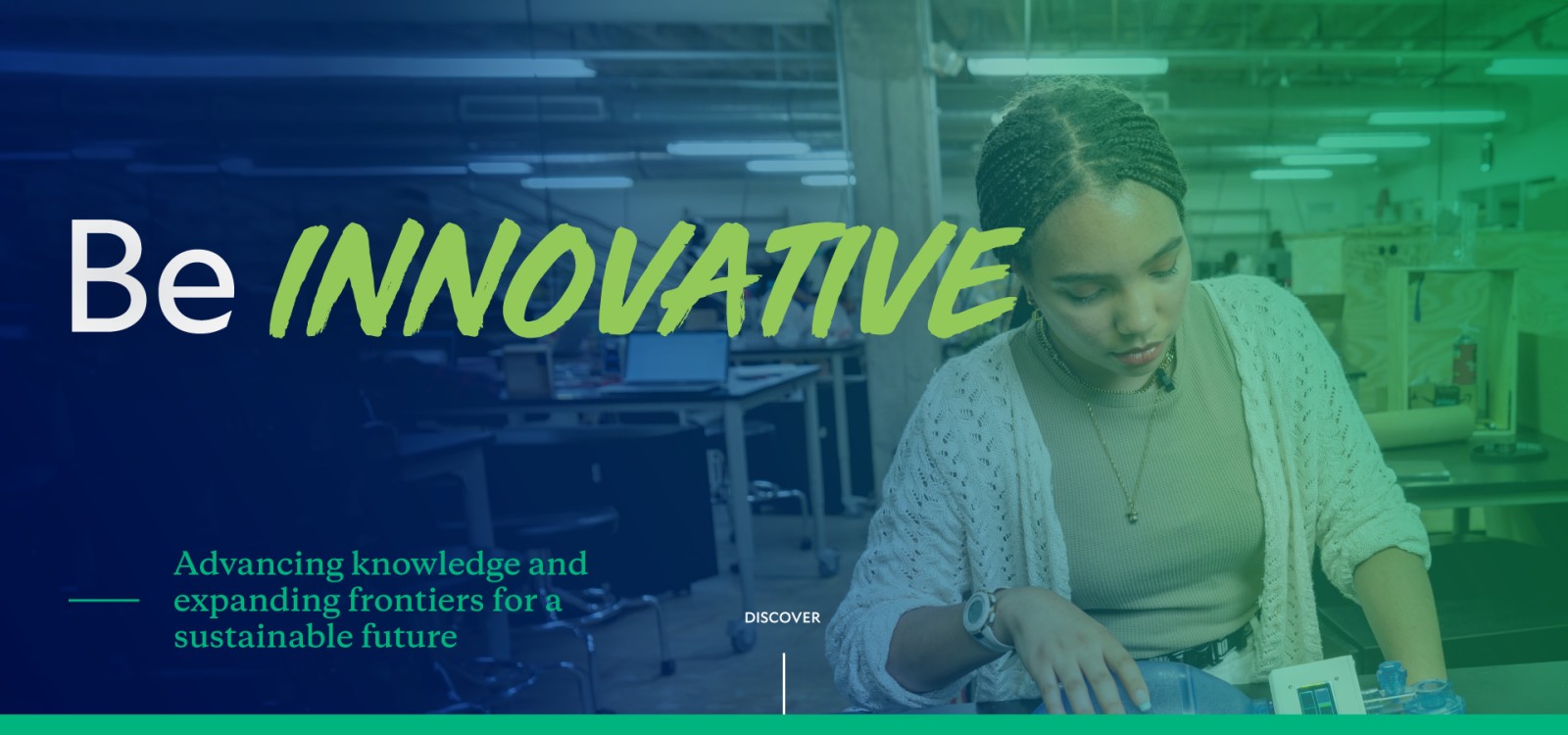
We are advancing curiosity-driven inquiry and supporting discovery among our forward-looking scholars, students and educators — humanists, scientists and engineers alike — who will explore the biggest questions of our time and solve our most pressing challenges.
The Be Bold Campaign will empower Rice students and faculty to transform ideas into action and research into solutions, ensuring real progress in energy transition, in cyber security, in disease prevention, in injury recovery, in mitigating climate change and so much more. In totality, they will boldly pursue new avenues for stronger communities, a healthier environment and better lives.
Equip our students and faculty with the freedom to ask big questions and the resources to pioneer groundbreaking answers. We have assembled the brightest minds, and they can make the impossible, possible.
With your support, we will...
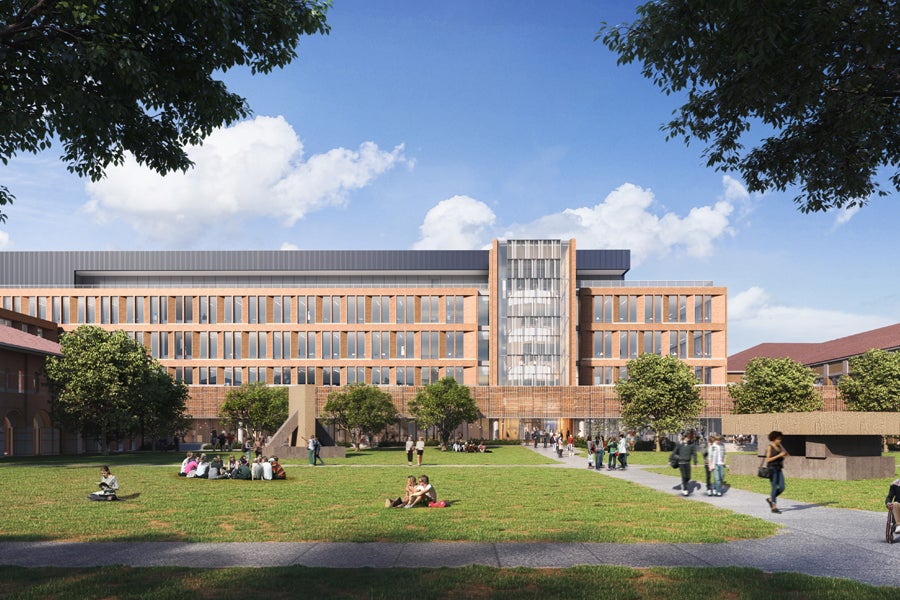
Transform scientific discovery and academic knowledge into meaningful solutions that will better our world.
Rice’s engineering and science faculty are leading some of the most inspiring scientific breakthroughs and technology innovations of our time. The Ralph S. O'Connor Building for Engineering and Science will sit at the forefront of those discoveries and serve as a resource that will inspire and support a new era of innovation and entrepreneurship. The facility’s increased capacity for research and professional collaboration will significantly boost educational opportunities for students and fuel some of Rice’s most exciting research initiatives, including materials science, Rice’s Quantum Initiative, Carbon Hub and the Nanotechnology Enabled Water Treatment Center (NEWT).
Visit thefutureofresearch.rice.edu to explore the possibilities.
Teach our students to use multidisciplinary inquiry to tackle big questions that don’t have easy solutions.
Identifying the innovations that will change the world requires much more than technological expertise. To truly understand the challenges facing the world today requires critical thinking skills, a broad historical perspective, sociological insights and more. The Big Questions courses from the School of Humanities pose these big questions and then approach the answers from multiple angles, perspectives and disciplines. The series asks: What is the ethical thing to do? Is all the world a stage? Where is utopia? Who should vote? With additional faculty resources, we will expand the courses to meet growing student demand for critical and constructive inquiry.
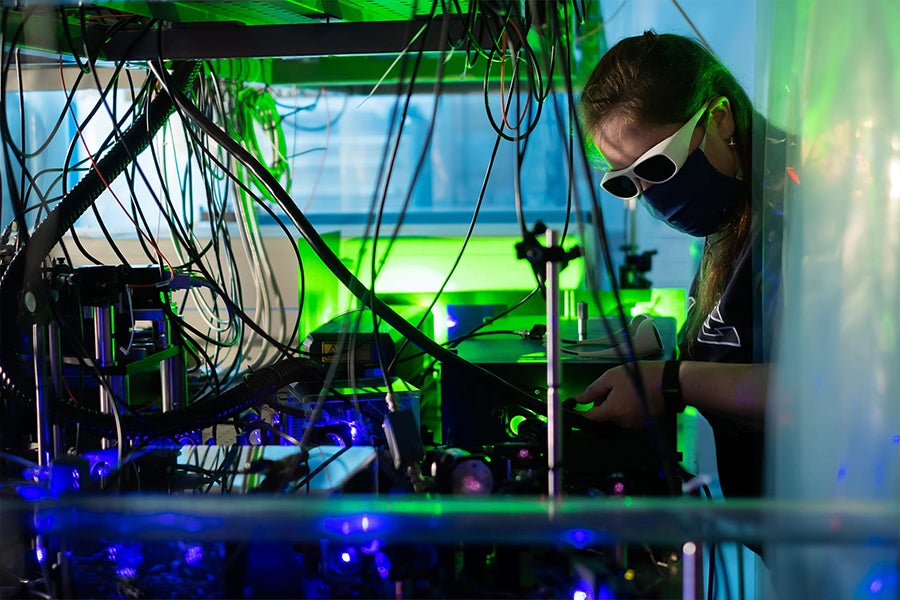
Put Rice at the forefront of the quantum revolution.
The world is at the start of a quantum revolution that promises to change the way we measure, process and transmit information. This will lead to dramatically advanced sensors and computers to power better data encryption, stronger national security networks, the design of new drug compounds and next-generation technologies across medicine, security and the environment. Rice is a world leader in the scientific foundations and enabling technologies that are essential for this endeavor, from engineered quantum systems in ultracold atoms to quantum materials and quantum photonics. Rice’s Quantum Initiative will build upon this bedrock, with interdisciplinary academic programs, expansion of research infrastructure, and additional faculty hiring.
Explore other worlds in search of life and an understanding of the conditions needed to sustain it.
Imagine discovering signatures of life on another planet — and using that knowledge to explain the origin of life and how to sustain it here on Earth. This vision drives the construction of a new telescope that can resolve individual proto-planets forming around distant stars, planned NASA missions exploring our solar system, and interdisciplinary research in the Wiess School of Natural Sciences in planetary exploration. Now we aim to be a world-leading hub for studying all aspects of planetary habitability and astrobiology by leveraging these research strengths and our proximity to NASA Johnson Space Center and the Lunar and Planetary Institute.
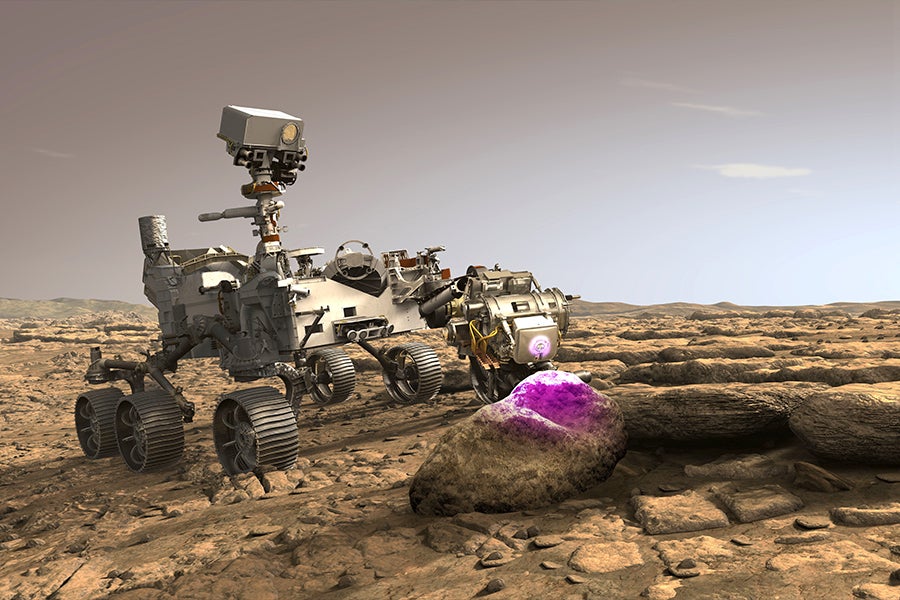
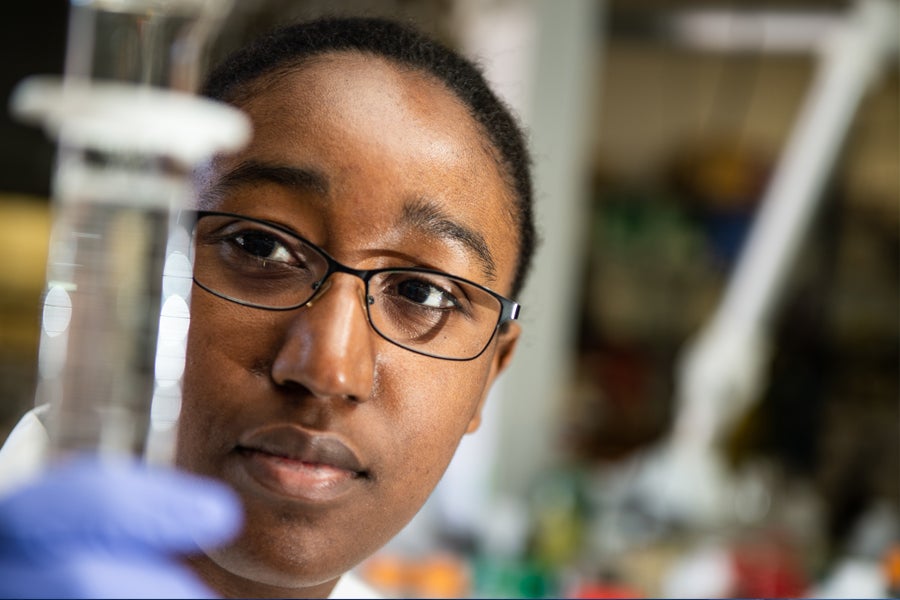
Advance materials discovery, design, and manufacturing.
From silicon to plastics to batteries to catalysts, materials have defined the modern age. To power the next great technological revolution, Rice is creating new materials with designer properties, from the bottom-up and the top-down. With a foundation of world-renowned materials researchers, Wiess School scientists, the new Ralph S. O'Connor Building for Engineering and Science, and transformational investments to support these initiatives, Rice will be the premier 21st century global destination for research in advanced materials.
Strengthen health, injury prevention and trauma recovery through a new Houston Methodist/Rice University Center for Human Performance and investments in the Department of Kinesiology.
Through unparalleled teaching, interdisciplinary research, and the resources of the globally recognized Texas Medical Center, Rice Kinesiology has forged a reputation for educational excellence and for producing successful graduates across a wide range of health fields. Now, through a new Methodist-Rice Center for Human Performance, the program is positioned to take the next bold leap in advancing human health and quality of life. The Center connects Rice’s faculty and students in kinesiology, Rice’s student-athletes, and clinicians at Houston Methodist to expand research, create new training opportunities and more broadly address a range of health challenges, from preventing chronic and infectious diseases, to enhancing athletic and artistic performance, to caring for an aging population and eliminating health disparities.
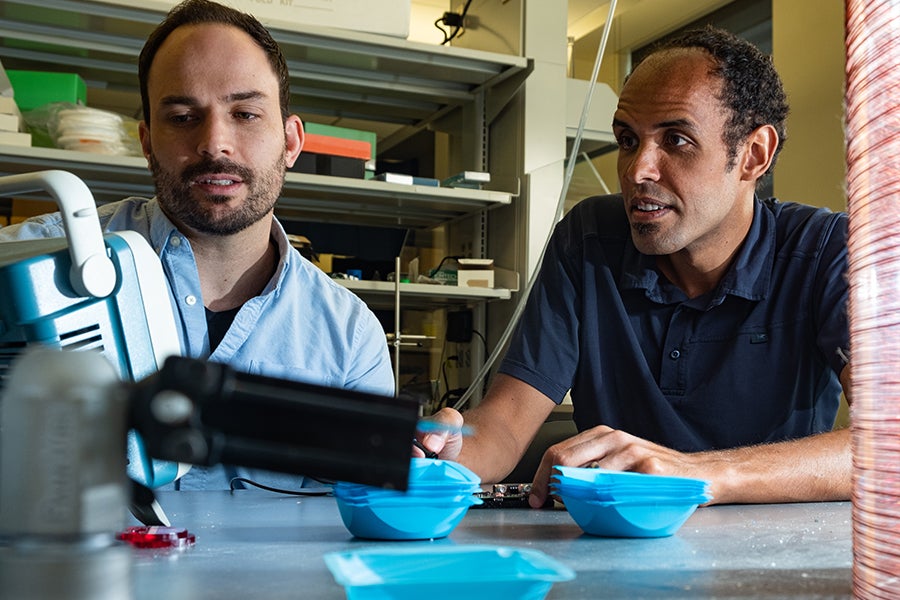
Improve lives by restoring and extending the capabilities of the human brain.
With more than a billion people in the world today affected by disorders of the nervous system, the need to understand the brain is immediate and consequential. Students and faculty at the Rice Neuroengineering Initiative work closely with clinicians and their patients in the Texas Medical Center to study neural function to devise new technologies for understanding the nervous system and interacting with the brain. They use these insights to create novel ways to diagnose, treat, and even prevent diseases and disorders ranging from Alzheimer’s, epilepsy and Parkinson’s to chronic pain and depression. With the support of the Rice community of scholars, alumni, parents and friends, the Rice Neuroengineering Initiative will place the university among the world’s leaders in this field.
Maximize the benefits and minimize the costs of technology.
Rice students love technology — using it, changing it, inventing it. The Technology, Culture and Society initiative provides education, outreach, research and scholarship focused on fully realizing the consequences of technology, good and bad, as well as proposing ways to mitigate its ill impacts. A campus-wide initiative, the program includes faculty who span nearly all of Rice’s schools and institutes, from psychology to environmental engineering to chemistry to political science, bringing cross-cutting perspectives to a vital topic that affects our day-to-day lives and livelihoods.

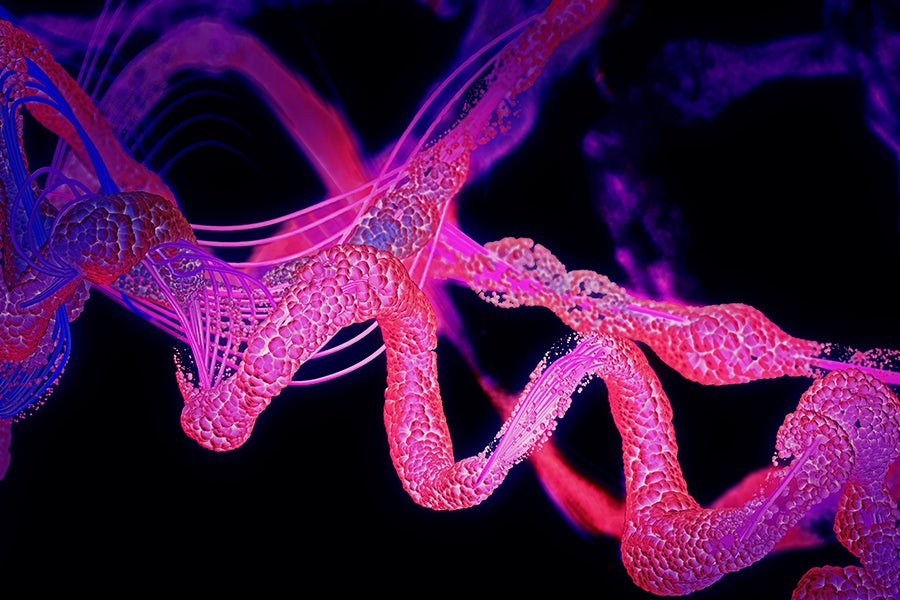
Pioneer new tools, technologies and theories to design biological systems that will improve health and sustainability.
Synthetic biologists develop tools to write biological programs in DNA, insert them into genomes and boot them up like software. This bottom-up approach to biology harnesses successes in cellular design to increase our understanding of living systems and create transformational technologies. In the coming decades, synthetic biology will revolutionize medicine, agriculture, chemicals synthesis, energy, electronics and our understanding of life itself. Further investment at Rice will solidify Rice’s position as a world leader in the field and open up exciting new innovations, including the creation of hybrid cells and materials (bioelectronics), technologies to prevent vector-borne diseases, and smart soils that improve agricultural productivity while minimizing fertilizer use and greenhouse gas emissions.
Achieve a zero-emissions future and accelerate the energy transition through green hydrocarbons.
Envisioning a zero emissions future, the Carbon Hub seeks to eliminate carbon dioxide emissions by efficiently splitting hydrocarbons to make clean-burning hydrogen fuel and solid carbon materials that will house, move, clothe and feed people. Through a novel, holistic approach that builds on advances in nanotechnology, earth sciences, architecture and materials science, scholars are working on everything from biomedical nanotechnology that addresses human health at the cellular level, to the design and construction of buildings, to the creation of synthetic grade biochar that can limit the use of fertilizer and improve soil viability in large scale agriculture.
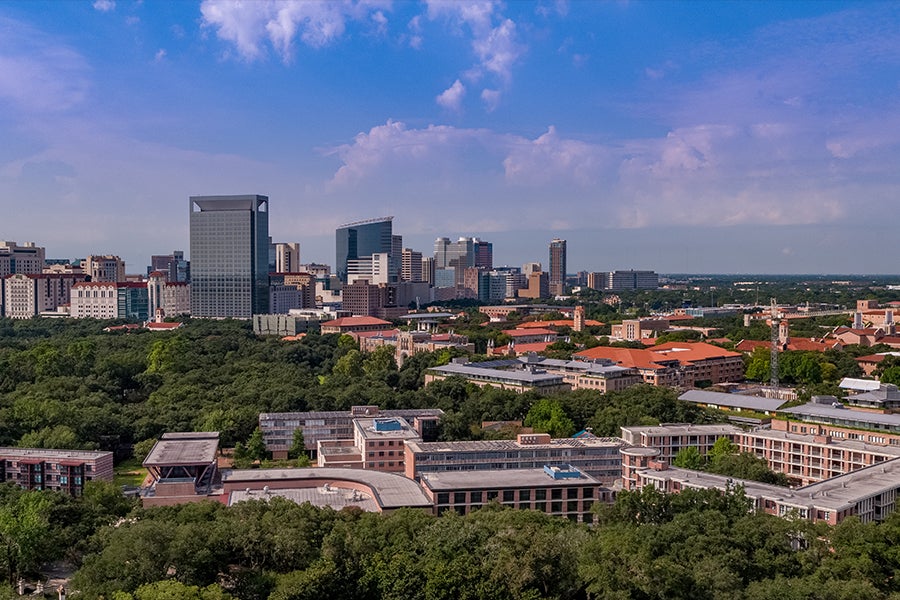
Build smart cities of the future by forging new partnerships between brilliant technology innovators, architects, designers and planners.
By 2050, according to the United Nations, 68 percent of the human race will live in urban areas, representing an additional 2.5 billion people. To create sustainable, resilient cities of the future, Rice’s engineers are partnering with social scientists, architects, policy experts and data scientists to build better infrastructure and management, with innovative solutions rooted in high-tech materials, sensor networks and better data. Rice engineers are at the forefront of solving these problems through disruptive technologies, including advanced robotics, automation, the Internet of Things, structural dynamic systems, earthquake engineering, smart structures and strain sensing using nano-materials.



